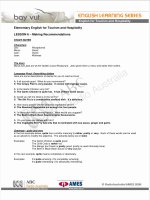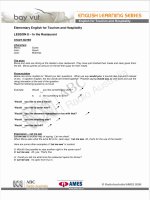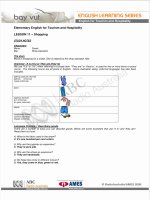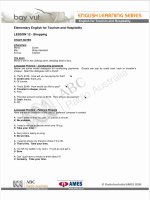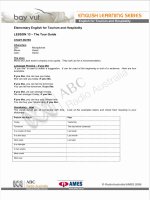English for Internal Auditor
Bạn đang xem bản rút gọn của tài liệu. Xem và tải ngay bản đầy đủ của tài liệu tại đây (1.3 MB, 139 trang )
Amanda C. Murphy
with Catherine Bell
English
for Internal Auditors
Pubblicazioni dell’I.S.U.
Università Cattolica
UNIT 1
ON THE TOPIC OF... MULTINATIONALS1
Answering precise questions
Task 1 Answering precise questions
Have a look at the Eni website (www.eni.it), click on English and find out the
answers to the following questions. In the space below, take notes from the
website and then write a profile of Eni in about 100 words.
How big is the company in terms of employees?
Where does it operate?
What areas does it operate in?
How and when did it begin as a company?
When was it privatized and how successful was the operation?
How involved is Eni in the cultural scene in Italy?
Notes
Size:
Where:
Areas of activities/business areas:
History:
Cultural involvement:
1
All the information in this chapter referring to multinationals is freely available on the
companies’ websites.
7
Focus on Language 1 Comparing and Contrasting
Useful phrases
Look at the following sentences, and note how the comparisons and contrasts
are made.
Comparing:
BP set up a plant in Russia in 1997. Similarly, the Shell Group established a
base there in the same year.
Like British Petroleum, the Shell Group is increasing its activities in solar
power generation.
Compared to the Shell Group, Eni outsources fewer of its activities.
Both TotalFinalElf (TFE) and Eni are listed on the New York Stock Exchange.
Neither the Shell Group nor Eni produce coal or nuclear power.
Eni is as important as Shell from the point of view of the production of oil and
gas.
*NB as is not used to set up a comparison.
*Eni, as the Shell Group, has a Gas and Power division.
Instead of as, use like to make comparisons.
Eni, like the Shell Group, has a Gas and Power division.
Contrasting
Unlike BP, most of Eni’s gas stations are in Europe.
Eni is a smaller company than Shell, and is present in fewer countries around
the world.
The Shell Group has a more vertical structure than Eni.
Linking words showing contrast
BP was founded as a private company, whereas Eni has always been a public
one.
While Eni is listed on the Milan Stock Exchange, TFE is listed on the Paris one.
Exxon Mobil is a major manufacturer and marketer of basic petrochemicals.
Eni, on the other hand, has gradually reduced its production of petrochemicals.
Superlatives
Russia is the world’s largest oil and gas producer.
While Eni is the Italian leader of the energy sector, Repsol is the most
important company in Spain and Argentina.
8
Exercise 1
Put these adjectives into their comparative and superlative forms. Add on
the appropriate ending to each word (-er or -est)
Adjective
Old
Short
Fair
Clean
Fat
Big
happy (Careful
of the spelling!)
Late
Fine
Comparative form
old
short
fair
clean
fat
big
happ
Superlative form
old
short
fair
clean
fat
big
happ
late
fine
late
fine
Adjectives with irregular comparatives and superlatives
Adjective
Good
Bad
Far
Old
Little
Comparative form
Superlative form
The following adjectives can take either -er -est or ‘more’ ‘most’.
common
gentle
cruel
likely
pleasant
simple
handsome
narrow
polite
stupid
The comparative of adjectives with more than two syllables is formed by using
more + base form + than or less + base form + than. Superlatives of the same
adjectives are formed by the most + base form + of/in.
E.g. John is more daring than his sister at skiing.
The most daring of all is Joe.
Base form of adjective
Intelligent
Interesting
Beautiful
Comparative form
Superlative form
You can use adverbs of degree in front of comparative adjectives.
a great deal
a lot
rather
far
much
a bit
a little
slightly
9
E.g. This car’s a bit more expensive
Now I feel a great deal more confident
She’s much more intelligent that her brother
Comparisons of equality
as + base form of adjective + as
not so/as + base form of adjective + as
E.g. He’s as strong as his brother, but he’s twice as strong as his sister.
Liz’s job is not so stressful as John’s.
How do we say “meno + adjective” in English?
It’s much more usual to use “not + adjective + as” rather than less + adjective.
E.g. Your report is not as clear as it should be.
rather than
Your report is less clear than it should be.
What is the equivalent of “sempre più + adjective” in Italian?
E.g. È sempre più cara la vita.
In English, you use the comparative adjective and just repeat it:
richer and richer
better and better
fatter and fatter
more and more complicated
less and less satisfied
The thicker the glass, the more expensive the window.
The more powerful the job the greater the responsibility.
Comparing and Contrasting Multinationals
Task 2 Taking notes from written text
Look at two other websites of companies that are comparable to Eni (E.g. The
Shell Group, BP, Esso). Take notes on the same features that you wrote about
in Task 1.
10
Focus on Language 2
The simple present and the simple past tenses
When you are describing a company, you will probably use the simple present
to describe its features, and the simple past tense to talk about its history.
E.g.
Simple present
At present Eni operates in over 70 countries, while Repsol employs only
35,000 people.
Simple past
In 2002, Eni daily production was greater than Repsol production. It amounted
to 1,472,000 barrels of oil equivalent (boe), while Repsol production reached
just 1,000,000 boe.
Exercise 2
Conjugate the verbs in the following paragraphs, taken from audit reports. The
tenses used are present simple or past simple. You may have to use the passive
voice.
BACKGROUND Bugsy A/S (provide) _____________ diversified Marine
Services within and outside Scandinavian Waters, and (offer) _____________
a fleet of 30 Tugs and Barges together with equipment.
Bugsy (found) _____________ on 21-12-1988 and (be) _____________ a
private limited company.
Its previous name (be) _____________ A/S Saarben & Sønn. On 5-12-2000
Poseidon Oslo (merge) _____________ with Bugsy and (retain)
_____________ the trade name of Bugsy A/S.
BACKGROUND MCC Shipping A/S (be) _____________ a company with a
wide international network of partners and agents performing purchasing,
expediting, special transports, warehousing and related services world-wide for
the demanding requirements of the Offshore and Marine Industry. The GMC
Head Office (locate) _____________ in Lowestoft where they (have)
_____________ a complete service base facility including 210m deep water
quay, 4,000m² indoor warehousing and 10,000m² outside storage area. They
(have) _____________ have branch offices in Lewes and Hastings. MCC
Shipping A/S (be) _____________ a private, limited company, which
(establish) _____________ on 6-06-1937 and (be) _____________ part of the
MCC Group, which is 100% owned by local investors.
11
Focus on Language 3
Talking about yourself
Where, when and what did you study?
a) I + studied + subject + at the University of name of city
E.g. I studied Economics at the Catholic University of Milan
b) I + studied + subject + at name of city University
E.g. I studied Management Engineering at Bari University
If you want to add in the year when you finished your degree, you can say:
c) I graduated in + subject + in + year + at/from the University of name of city
I graduated in + subject at/from name of city University
E.g. I graduated in Business Studies in 2001 from Almaty University
A slightly less formal way of expressing this:
I got my degree in 2002.
You may have more than one degree, in which you case you can say:
I got my first degree/my BA2 from Cambridge University, and then my MA/my
Master’s from the University of St. Andrews.
Travelling to work/to university
How do you get to work and how long does it take you?
I commute (travel a certain distance to work on public transport) to work.
I come to work by train
I get the train to university.
It’s a short bus ride to work.
I get the underground/I come by metro.
I walk to work.
I come on my bike/by bike.
It takes (me) about half an hour/a good hour
2
BA, when referring to an academic degree stands for Bachelor of Arts, which normally takes 3
years. An MA, a Master of Arts, normally takes one more year. You can also say a Bachelors’ or
a Master’s, leaving out “of arts”, particularly for subjects outside the humanities.
13
Talking about where you live
Where do you live? Who do you live with?
I share a flat/an apartment with two others.
I’m living in a one-bedroom flat on my own.
I live with my parents/uncle/aunt/sister/brother.
I’m living in a University Hall of Residence/in a Residence run by nuns.
Grammar Question
Q. Why use the present simple or the present progressive here?
A. Using the present simple tense when you talk about where you live implies a
certain sense of stability. Using the present progressive implies that your
attitude to the place is that it is temporary. Temporary may be quite a long
time, e.g. you may have come to the city for a year, but you imagine that you
will not stay afterwards.
Task 4 Asking and answering questions
In a small group, practice asking and answering questions about your
education, accommodation, travel to work or university etc.
Useful questions:
Background
Where were you born?
Education
What school did you...?
university are you studying at?
Travel experience
What countries have you...?
When...?
What...?
Family
Are you married?
Have you got...?
Sports/hobbies
Do you play...?
What do you do in your spare time?
Work experience
What do you do? What is your job?
How long have you...?
How long did you...?
14
Hopes/intentions for the future
Possible answers:
I’m interested in...
I quite like...
I (really) like...
I’m (really) keen on...
I’m fond of...
I’m crazy about...
What do you want to...?
When are you going to...?
I’m good/bad at...
I’m not so good at...
I’m an expert skier!
Focus on Language 4
Describing Organizations
Describing any company is a complicated business, but when it comes to
multinationals, listed on the stock exchange, it can be even more confusing.
The website for Eni clearly sets out the model of Corporate Governance
adopted by the company.
Have a look at the site.
It can be seen that Eni’s shareholders nominate the Board of Directors, which
is made up of the Chairman and the Chief Executive Officer (who has his own
staff), seven other Directors, and three different committees: the Internal
Control Committee, the Compensation Committee, the International Oil
Committee.
Departments that are accountable to the CEO:
Chief financial officer, personnel and organization, strategies and international
relations, corporate affairs, legal affairs, administration, procurement, public
affairs and communication, chief technology officer, safety and environment.
There are also three general directors of Exploration and Production, Gas and
Power, Refining and Marketing.
Management
Eni General Directors
Eni Directors
Executive Directors of Eni’s Major Operating Companies
There are also Statutory auditors, External Auditors and a Representative of the
Corte dei Conti (Court of the Accounts).
15
Next: note-taking. What makes good notes?
a) Accurate information
–
–
–
–
–
Who was talking?
When were they talking?
Why were they talking?
Where were they talking?
What did they say?
b) Clear presentation
– Notes need to be useable afterwards
What do good notes look like?
They contain
–
–
–
–
clear details about the date,
the speakers,
the purpose of the encounter,
any other relevant information about the situation
They use
– abbreviations, phrases, not complete sentences;
– all the space on the page
– anything else you can think of?
Task 6 Taking notes from an interview
Taking notes from an interview
Get a DVD of any recent film which has audio in English from your local
video rental shop.
Go to the Extra Contents where you can find short interviews. Popular films
with famous actors and actresses tend to have light-hearted interviews in the
“extras” sections.
18
Listen to an interview once, without subtitles.
Then put the subtitles on, and listen again.
Lastly, listen and take notes below.
Notes from an interview with _______________________________________
19
UNIT 2
TALKING – INFORMALLY AND FORMALLY
Focus on Language: Social situations
Introductions, socialising and leave-taking
Task 1 Introducing other people
In this section you will find phrases and expressions to use in situations where
you are introducing people to each other, and when you are leaving. In pairs,
practise using them.
Making introductions
Anna, this is Jim.
Bernie, do you know Patrice?
Pat, have you met Maria?
Can I introduce you to Mark Barnard our Finance Director?
NOT
Can I introduce you Mark Barnard?
I’d like you to meet...
Are you Ms Valdez by any chance?
You must be Larry Kaplan.
Answering
Nice to meet you.
It’s a pleasure.
Pleased to meet you too.
Mentioning common interests
I think you
I know you have both
Leaving
Well, I really must be going.
Anyway, I’ll see you soon.
both know Maria.
both like skiing.
are both interested in the new project.
been to Brazil.
worked in R&D.
Yes, hope so.
21
Hope to see you again soon.
It was nice meeting you.
It was good to see you again.
Yes, that would be nice.
It was nice to see you, too
Task 2 Introducing yourself
Match a sentence on the left with a suitable response on the right,
How do you do?
Pleased to meet you.
How are you?
Not too bad thanks.
Lovely to see you again.
Hi.
How’s business?
Just great. No hassles at all.
How was your flight?
Nice to see you, too.
Hello.
All good, I hope.
Are you Gianni Rossi?
How do you do?
Hello. My name’s Jack Briggs.
Very well thank you.
Oh, hello. I’ve heard a lot about you.
Yes, that’s right.
Focus on Language 2: Positive and negative adjectives ending in -ed and -ing.
Interested versus interesting
Many adjectives expressing an opinion or a reaction have two forms, ending in
-ed and in -ing, as in interested, or interesting.
Examples:
I was surprised that he turned up late… but
It was surprising that he turned up late.
Task 2 Writing about yourself
Write one sentence for each adjective below, referring to your own lives. You
can use the following language patterns, or invent your own:
22
I am very adj +ed that…
I find it adj +ing that..
It is adj +ing that…
positive adjectives
– surprised/surprising
– fascinated/fascinating
– interested/interesting
negative adjectives
– bored/boring
– disappointed/disappointing
– shocked/shocking
Can you add any more pairs of adjectives like this?
Here are some more pairs:
Amazed/amazing
Fascinating/fascinated
Exciting/excited
Astonishing/astonished
Relaxed/relaxing
Annoyed/annoying
Disgusted/disgusting
Exhausted/exhausting
Embarrassing/embarrassed
23
Learning tip
You can remember how to use these adjectives by thinking that if you refer to
someone’s reaction with the verb be, you often use an adjective ending in -ed:
she was very interested in my photos of Thailand. If you refer to something or
someone and the effect they produce in you or someone else, you use an
adjective ending in -ing, as in She found my photos of Thailand very
interesting.
The Language of Auditing 1
Task 3 Reading about the auditing process
Read the following slides from a Saipem Kick Off Presentation in Saudi
Arabia. The presentation introduces the whole auditing process and we will
refer to it again later
24
25
26
27
28
29
30
31
32
33
34


